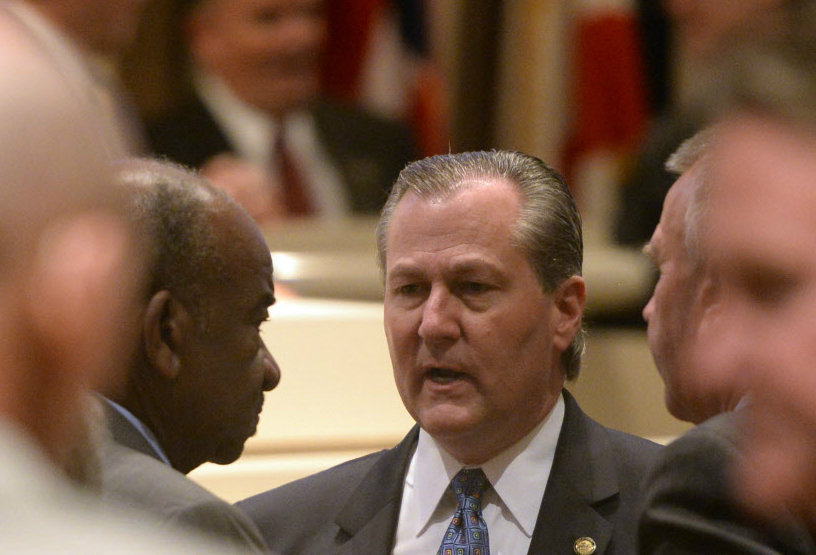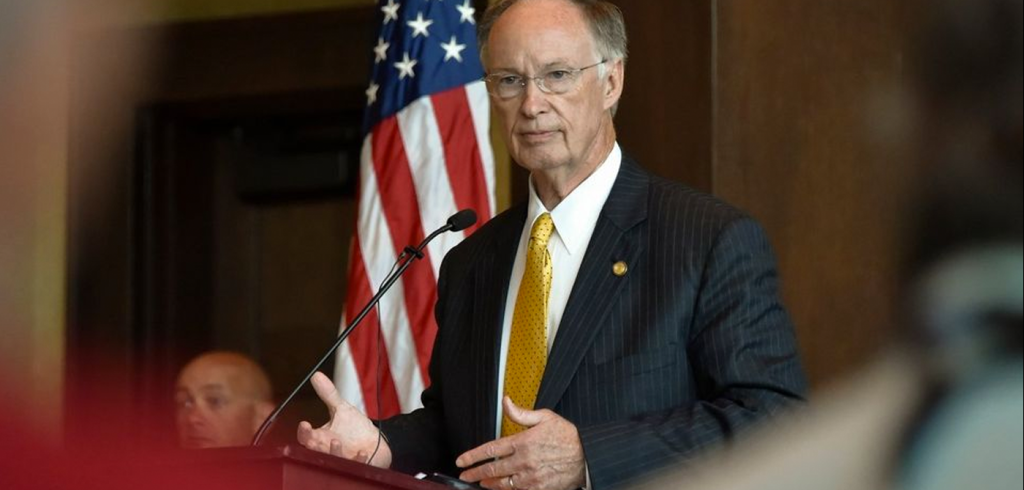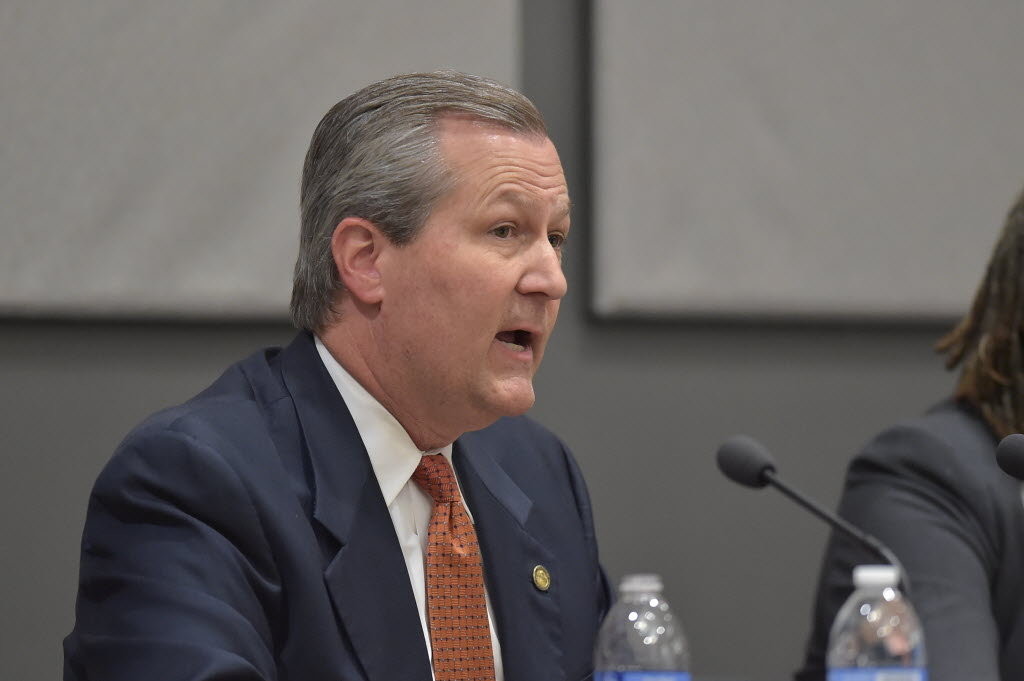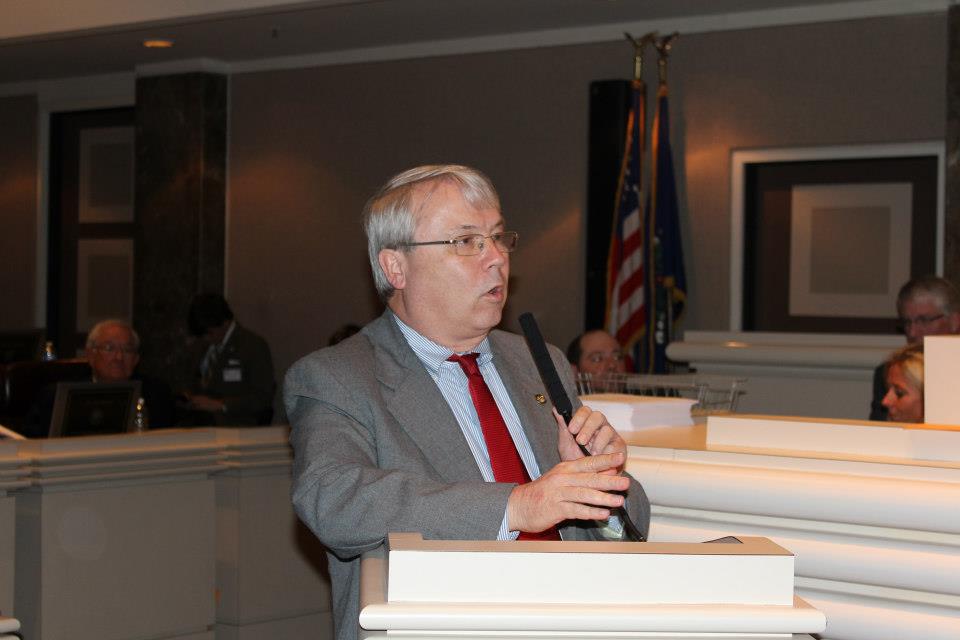Reactions to the Mike Hubbard guilty verdicts

A jury found Alabama House Speaker Mike Hubbard guilty on 12 of 23 felony ethics charges Friday. He was acquitted on the other charges. Here’s what Alabama lawmakers and government officials are saying of the guilty verdicts. Governor Robert Bentley (via a news release): “Alabama is strong because our people are strong. As leaders we were placed here to serve our people and that is exactly what we are going to continue to do. God has assigned us to this task, and we will work hard to honor Him. I have the utmost confidence in the men and women of the Alabama Legislature. We will all continue working together to solve the real problems facing our state and to help Alabamians. We will pass a balanced budget that funds essential state services, create well-paying jobs and care for our sick, our elderly and our children. No matter how difficult the challenge, the people of this state will know we are working hard every day to serve them.” Lt. Gov. Kay Ivey: “The verdict reached by twelve Lee County jurors brings finality to a lengthy legal process that has impacted our state government and public trust. I pray that Mike, his wife Susan, and their sons will be strengthened and supported through the uncertainties of this difficult time. I respect the jury’s hard work and accept their findings. It is not easy to sit in judgment and these jurors did their duty as citizens of Alabama. One of our basic founding principles is the safeguard that due process affords to protect individual freedoms when justice is administered. The rule of Law and the right to a trial by jury has helped maintain our democracy for more than two centuries. The consistency of our legal system in treating everyone as an equal before the Law will continue to sustain us now and in the future. I believe in the rule of law, Alabama and her people. I know that our best days are ahead of us.” Attorney General Luther Strange (via news release): “This is a good day for the rule of law in our state. This kind of result would never have been achieved had our office not put together the finest public corruption unit in the country. I’m very proud of their work. This should send a clear message that in Alabama we hold public officials accountable for their actions.” State Representative Jack Williams (statement to Alabama Today): “This is a sad day for Alabama and a sad say for Speaker Hubbard, his family and friends. We operate under the rule of law and the House will continue to move forward under new leadership. I urge all Alabamians to join me in praying for Mike, Susan and his sons during this very difficult time and to pray for our state government for wisdom and guidance as we move through this situation.” State Representative Will Ainsworth (via his Facebook page): “As a freshman legislator, I have worked hard to bring a new mindset to state government — a mindset that doesn’t operate in the shadows of backroom deals or rely upon the politics of the past. It’s disappointing when anyone succumbs to the temptations that Montgomery offers, and when a leader is the one who strays, that disappointment is magnified tenfold. All elected officials must be mindful of the words in Proverbs 11:28, “Those who trust in their riches will fall, but the righteous will thrive like a green leaf.” Acting House Speaker and Speaker Pro Tem Victor Gaston (via news release): “The Alabama House is not defined by the actions of any one member, it is defined by the motto that appears on the wall of our Chamber, “Vox Populi,” which means “Voice of the People.” This incident, no matter how regrettable, offers strong proof that the ethics reforms passed by the Legislature in 2010 remain among the toughest in the nation. I know that every House member, regardless of party, will keep Mike Hubbard and his family in our prayers as he begins this next, most difficult chapter in his life.” Decatur-Republican, House Majority Leader Micky Hammon (via news release): “While today is a sad one for those of us who served with Mike Hubbard, it is also one that reaffirms the fact that our justice system is an impartial one. The Alabama House will move past this chapter in its history and remain committed to the guiding conservative principles that the majority of our members hold close to their hearts. Issues like fiscal responsibility, growing our economy, improving education, and fighting unnecessary federal intrusion into the lives of Alabamians will continue to be our highest priorities.” House Minority Leader Craig Ford: “This is a dark day for Alabama. Mike Hubbard led Republicans to a supermajority on a platform of cleaning up corruption in Montgomery. But instead of cleaning up corruption, Mike Hubbard and the Republican leadership in all three branches of our government have embraced corruption. They have forgotten they are supposed to serve the people, and not the other way around.” Alabama Republican Assembly (via news release): The Alabama Republican Assembly would like to thank the twelve members of the jury in Lee County for their role in our judicial system and holding public officials accountable for their actions. These men and women found House Speaker Mike Hubbard guilty of twelve felony charges relating to political corruption and abuse of power. These jury members displayed a conviction that was lacking in our state legislature, which voted to keep Mike Hubbard as Speaker despite the 23 indictments and previous findings disclosed by an audit of the Alabama Republican Party. The Alabama Republican Assembly hopes that integrity can be restored to this office with the election of a new Republican Speaker that is free of any affiliation with the unethical acts of the previous administration. A Speaker that will stand steadfastly for conservative Alabama values and against the corrupting influences of organized gambling, special interest lobbyists, and corrupt politicians. We
Alabama legislative preview: May 3 — May 4, 2016

Two days. That’s all Alabama’s state lawmakers have to complete their legislative priorities for the year. Some bills will end up languishing in the annals of Alabama history, while others will get their day on the governor’s desk. The entire session has been covered in the grey cloud of scandal, between accusations of Gov. Robert Bentley‘s infidelity, and the impending ethics trial of Speaker Mike Hubbard, but legislators stayed on track … mostly. Some much-debated bills like the gas tax are dead for good this year, while others, like payday lending reform and industrial hemp legalization, are walking a blade-thin line to final passage. Here is what legislators have on their plate for the final two days of the 2016 Regular Session. Here is what legislators have on their plate for the final two days of the 2016 Regular Session. House — Convenes Tuesday at 1 p.m. SB372 creates a new provision in Alabama’s controversial “chemical endangerment of a child” law, allowing the consumption of controlled substances under the “good faith” supervision of a physician. The chemical endangerment law came under fire last fall after a searing investigation by AL.com and ProPublica. Sponsored by Sen. Clyde Chambliss (R-Montgomery) in the Senate and Rep. April Weaver (R-Alabaster) in the House. SB91 regulates Payday Lenders, restricting the interest rates and fees they may charge. The bill being considered in the House Tuesday is a watered-down version of one passed by the Senate in early April. Should it pass the House it would have to be reconsidered by the Senate in the waning hours of the Session on Wednesday. Sponsored by Sen. Arthur Orr (R-Decatur) in the Senate and Rep. Danny Garrett (R-Trussville) in the House. SB268 Currently, an inmate’s eligibility for Medicaid is terminated once they are incarcerated. SB268, already passed by the Senate, would change that termination to a suspension. The bill’s sponsors argue this will help reformed convicts land back on their feet when their sentences are complete. Sponsored by Sen. Cam Ward (R-Alabaster) in the Senate and Rep. Chris England (D-Tuscaloosa) in the House. SB347 which would give the Department of Agriculture and Industries the authority to study, regulate, and tax industrial hemp, and reclassify the plant as separate from marijuana. Similar bills have been passed previously in both the House and Senate, but because they weren’t identical they must be considered again. Sponsored by Sen. Paul Bussman (R-Cullman) in the Senate, and Rep. Ken Johnson (R-Moulton) in the House. Senate — Convenes Tuesday at 1 p.m. HB204 reorders the names appearing on primary ballots in presidential election years to present elected official positions first, and delegates to the national convention last. Currently, the delegates come directly after the presidential candidates themselves, an arrangement found to be confusing for many primary voters, as they had to sift through a litany of names they didn’t recognize to find the candidates for federal and state offices. Sponsored by Rep. Randy Wood (R-Saks) HB393 is the House version of the industrial hemp bill described above. HB433 prohibits a sexually exploited child from being “adjudicated, delinquent or convicted of a crime of prostitution.” Essentially, the bill protects children who are victims of sexual crimes or trafficking from being convicted of prostitution. The bill’s sponsor is a longtime advocate for harsher penalties for sex traffickers, and has fought to protect the victims of the deplorable practice. Sponsored by Rep. Jack Williams (R-Vestavia Hills) HB98 allows qualifying retirees from the U.S. Military to obtain concealed weapons permits from their county’s sheriff at no cost to them. The Sheriff may revoke the permit if cause is found. Sponsored by Rep. David Standridge (R-Hayden)
Alabama House passes anti-human trafficking bill

The Alabama House has approved a bill to crack down on predators seeking to purchase sex via human trafficking, what many consider the last existing form of slavery in the United States. The bill – HB 433, dubbed the “Safe Harbor Act” – passed the House on a unanimous 103-0 vote on Thursday. Rep. Jack Williams, who chairs the Legislature’s bipartisan Alabama Human Trafficking Task Force formed in 2014, sponsored the bill. The legislation is designed to treat minors caught up in the sex trade as victims, rather than willful law breaker, as it often the case now. HB 433 provides that any minor found to have committed prostitution under state law not be transferred to or tried in adult court, and that a list of services including counseling, substance abuse treatment, legal representation, and medical treatment be made available to them. The bill also requires Alabama businesses operating an “escort business of companionship” to registered with the Secretary of State, and provides for penalties for violations of the rules therein. A similar bill, SB 368 by Democrat Sen. Vivian Figures, was also introduced this Session, but has not gotten a hearing in the Senate Judiciary Committee. Advocates for sex trafficking victims have estimated the trade is the second-largest criminal industry in the U.S., topped only by illegal drugs.
Jack Williams: Easter reflections and Governor Robert Bentley

I am sitting at my computer on the Saturday of Easter weekend thinking about the past week in Alabama politics and in the life of Alabama Governor Robert Bentley. This is of course the day after Good Friday, the day we, as Christians, celebrate Christ dying for all of our sins, the veil in the Temple being torn in to giving man direct access to God. Tomorrow is the day we celebrate the resurrection of Christ from the grave, His victory over sin, over death and over Satan. Last Sunday the church celebrated Palm Sunday remembering Jesus’ triumphal entry into Jerusalem to the adoration of thousands. On Friday those who celebrated his entry and had hailed him as King turned on him and called for his crucifixion, preferring that a common thief and murderer be freed in his place. Today, between Good Friday and Easter Sunday I find myself asking has the church and have Christians forgotten the meaning of the story we celebrate during Holy Week. I have witnessed some of our Governor’s staunchest supporters turn on him. Many of his early supporters who are now hurt and disappointed in his failure calling for his resignation or impeachment. The stories seem juxtaposed against one another and seem to beg the question – do we believe what we celebrate? At this point let me state, I am not an apologist, nor a long time Robert Bentley supporter. In his first election I publicly supported his opponent, Bradley Byrne. During the six years he has served as Governor there have been several times he and legislative leaders have clashed on policy issues. I can’t recall a single time I sided with the Governor during one of these debates. Please understand the thoughts shared here are not those of the last Bentley fan still standing. They are more a reflection on my personal faith and a recognition that if the Gospel is true for me then it must be true for everyone. The message of the Gospel isn’t that you can live a better life following Jesus – the message of the Gospel is you cannot live without following Jesus. Our struggles and failures should constantly remind us how desperately we need Christ, unfortunately our perceived successes too often convince us instead of how well we are doing on our own. Sin is a strange thing. It’s a failure that we more quickly recognize in others than we do in ourselves. We have a tendency to understand our failures and excuse what leads us to fail. We also have a tendency to be deeply offended by those who sin differently than we do. Their sin just seems so much worse. If we are honest with ourselves and consistent with biblical teaching, we discover we are all in the same boat sinful and – short of the glory of God. Our Governor has spoken regularly of his faith. I believe it is real. His regular references to his faith have made this a much more bitter pill for some to swallow. How does a man who claims to believe what he claims to believe or be who he claims to be do these things? I don’t know the answer to that – I know, sometimes though, how I get into those situations where my beliefs and my actions are not consistent. I ask myself, how can I do this, then I’m reminded because I was trusting myself rather than living in total dependence on Christ. It’s hard to think of Governor Bentley’s situation without reflecting upon the story of David and Bathsheba. David should have been leading the army into battle but he stayed at the palace, saw Bathsheba taking her afternoon bath and send for her. The result – an unplanned pregnancy. David’s solution? Cover it up. He sent for Uriah, Bathsheba’s wife and sent him to his wife. Uriah would not go because his comrades were in battle. So David had him killed. Fortunately, in this situation Governor Bentley hasn’t been accused of murder. But not everything done in secret stays in secret. The prophet Nathan showed up and enraged David with a story of a rich man and a poor man. When Nathan revealed that the rich man was actually David he also shared with David the brutal consequences of his sin. Under the Law this was an offense David and Bathsheba could have been stoned for – but Nathan told David you will not die – but the child will. A very bitter turn, but not the end of the story – you see David and Bathsheba’s next child was Solomon, David’s successor to the throne and a part of the linage of Christ. At the time of David’s failure no one could have looked at David and thought he was in the right place. How could God have a king who would commit adultery and murder. But how many of us have sought solace in Psalm 51. Governor Bentley’s sin will be remembered by some for the next 50 years. David’s sin was chronicled by God and is remembered forever – but it is remembered as a story of redemption – not a story of failure. Hundreds of years after the fact Paul called David a “man after God’s own heart.” The Apostle Paul did not reflect upon David as an adulterer nor a murderer but rather as a man who loved God. Jesus was teaching at the Temple on day and a group of religious people brought him a woman who had been caught in the act of adultery. They asked him what should they do with her, since the Law commanded she be stoned. Eventually he suggested that the one without sin should cast the first stone. That quickly dispersed even this self-righteous crowd. Jesus asked her, where are those who condemn you, she told him no one did. Jesus, who was without sin, then stated, “neither do I condemn you, go your way and
Mobile delegation opposes amendment to allow vote on minimum wage hike

The House Committee on Mobile County Legislation met Wednesday to discuss a slew of local legislation, including HB248 from Rep. Napoleon Bracy (D-Mobile). The constitutional amendment would allow Mobile citizens to vote on whether or not to raise the county’s minimum wage to $10.10 an hour. Bracy brought forth the bill in the form of a constitutional amendment in order to skirt around legislation passed earlier this session. HB174 from Rep. David Faulkner (R-Birmingham), also known as the Alabama Uniform Minimum Wage and Right to Work Act, was filed to thwart efforts by the Birmingham city council to gradually raise that city’s minimum wage to $10.10 an hour over three years. After being signed into law by Gov. Robert Bentley, the bill effectively bars in Alabama city or county from raising its minimum wage. If passed, the amendment would have been voted on by Mobile County voters in the upcoming November election. At the time of the committee’s vote Wednesday, eight committee members were present. The four representatives who voted against the bill, causing voting to end in a tie and causing the bill to gain an unfavorable report, were Reps. David Sessions (R-Mobile), Victor Gaston (R-Mobile), Margie Wilcox (R-Mobile) and Jack Williams (R-Mobile). The four Democrats on the committee voted in favor of the measure. Because of its failure to garner a favorable report in the committee hearing, the bill will not be heard by the full House of Representatives.
Montgomery convention seeks to tackle Alabama human trafficking

A multitude of groups gathered at Embassy Suites in Montgomery Friday for a convention aimed at finding ways to end the scourge of human trafficking in the state, the majority of which threatens minors. Rep. Jack Williams (R-Vestavia Hills) chairs the state’s Human Trafficking Task Force and was on-hand to welcome guests to Friday morning’s convention. “I don’t want to sound like Donald Trump,” Williams said. “But this is going to be a great conference.” “The whole idea here is to exchange ideas and learn,” Williams continued, after brief statements from Alabama Attorney General Luther Strange. “The issue that we’re dealing with, for many, many years, was an issue in the rough part of town. This is no longer an urban problem, this is a problem that’s pushing outward.” At the conclusion of Williams’ statements, Raleigh Avenue Baptist Church Pastor Nic Seaborn made brief statements concerning his own encounters with the illegal sex trade in Alabama, which he said is taking place only blocks from his church. “The problem of sex trafficking is knocking on our door,” Seaborn said, as he rapped on the podium. “It’s like a cancer, it is spreading into our neighborhoods.” The first speaker of the day was Rachel Harper of Shared Hope International, who touched on the specifics of Alabama’s human trafficking problems and ways to tackle it. Just between January and February of this year, more than 1,900 ads for female escorts were displayed in Alabama. An Alabama State University study found that, in the 15 markets explored, one in 20 men are soliciting sex online, about 90,000 men in Alabama. “It’s everywhere,” Harper said. “It’s rampant.” Harper noted that 80 percent of buyers say jail time or public exposure would thwart their efforts, but Alabama is lacking in substantive laws to protect children and prosecute buyers. According to a presentation from Harper, Alabama is one of only a handful of states with no Commercial Sexual Exploitation of Children (CSEC) laws, meaning the state’s laws are designed to capture traffickers rather than buyers, which are more often than not complicit in the maltreatment of enslaved children. In Alabama, the law requires proof of “force, fraud or coercion” before a human trafficking charge can be levied, leaving buyers an out if they claim ignorance to the age or conditions of the purchased sex worker. Further, according to Harper’s presentation, there is no legal differentiation in the state between purchasing sex from an adult or a child. While the various groups gathered distributed handouts regarding ways to identify endangered children – inability/fear to make eye contact, may have “brand” tattoo, lying about age or possessing false identification and more – people are encouraged not to attempt to rescue victims. Human trafficking, also known as “Modern Day Slavery,” is the second largest criminal industry in the world and generates about $32 billion annually and predominantly victimizes females, a large portion of which are children. Williams plans to bring forth a “Safe Harbor Act” during this year’s legislative session, which will ensure that children ensnared by human trafficking are classified as victims rather than criminals.
Jack Williams takes issue with ALGOP resolution rebuking Mike Hubbard

State Rep. Jack Williams is not happy with the Alabama GOP’s steering committee’s resolution calling for House Speaker Mike Hubbard to step down, saying his ethics case proceeded with “blatant disregard for the rule of law.” In a conversation with Alabama Today on Monday, Williams said the steering committee’s decision – based upon a vote taken on a conference call “in the middle of the night” – was driven by political opposition to Hubbard. “We have at least on member on the steering committee who doesn’t like the Speaker’s leadership, and they couldn’t win this battle in the caucus where the decision was made, so they took this battle to the steering committee, where they only had to convince 10 people,” Williams said, noting that fewer than the full 20 members of the body voted on the resolution. “This is an embarrassing way for Republican leadership to conduct business. “That’s unfortunate that this has happened because the steering committee has abandoned the principle of innocent until proven guilty.” Williams also criticized the committee for taken a one-sided approach to the problem, pointing to misdeeds by the Attorney General’s office reported in the media. “Right now we only have accusations against the Speaker,” Williams said. “The only violation of the law that we know definitively is we know the prosecutor … has illegally leaked secret grand jury testimony to the media. Maybe that might be where the steering committee should shine their little flashlights next. “The greatest threat to liberty in the state of Alabama is abandoning our bedrock principles of democracy like innocent until proven guilty, and having a lawless Attorney General’s office that operates without regard for the rule of law or the rules of the grand jury and the courts. The prosecutors should be about justice, not about eliminating potential political opponents or settling scores; it should be about justice.”
Is John Archibald correct? You decide, is Jack Williams gutting ethics laws?

John Archibald wrote a column for Al.com accusing Rep. Jack Williams and the legislature of attempting to “gut the ethics law.” Williams didn’t mince words when addressing constituent concerns based on the column on his Facebook page, saying in part “the crux of his column is totally, 100% inaccurate.” Alabama Today reached out to Williams via a phone interview to discuss the changes his legislation for the second special session, House Bill 18 proposes. First let’s look at the 3 components of the bill as William’s explains via his Facebook: The least controversial part of the bill would lower the threshold of a widely attended event from 12 to 8. According to Williams, “This allows the Senate Democrat Caucus to meet with a group and eat while they are meeting.” The second provision according to Williams, “clears up coflicting opinions from the Attorney General’s office and the Ethics Commisioner’s office on legal defense funds for public officials. We patterned that section after federal guidelines.” The final provision,the one Archibald wrote about deals with legislators lobbying. According to Williams, “In 2014 the legislature passed an amendment to the ethics law that strengthened the revolving door prohibition on former legislators leaving – during their term – and becoming lobbyist. The ethics commission and the prosecutors wanted the language clarified – they wrote the provision John is questioning. Section 36-25-1.1 prohibits legislators from lobbying.” It was the third section that Archibald took significant issue with. “The section John wrote about was incidental, and honestly, the least significant change. We clarify language in bills every year. That section was included at the suggestion of the Law Institute,” Williams said. That said, Williams said he would be open to adapting the language to make sure the spirit of the law wasn’t changed saying, “I don’t have a problem adding ‘current and former legislators’.” He fully expected the second part to be the most controversial and it was certainly the part that got my attention. The second section deals with legal defense funds. When Alabama Today asked Williams if this language was included for Hubbard he said, “I’m doing it for anyone…Mike is facing this and there’s a conflict between the AG’s opinion and the ethics commissioner.” He went on to explain that he has given, over the past 10-15 years to two legal defense funds. He said court costs involved for both officials charged with crimes related to their office cost over two million dollars and both elected officials were eventually cleared of all wrong doing. So would it benefit, Hubbard? Williams says, “yes, him or anyone else.”
Alabama Senate committee votes to ban sales of fetal body parts

Today, legislation that would make the sale of fetal body parts for profit a Class B felony passed out of a Senate committee by a 12-1 vote. Sen. Bill Hightower (R-Mobile) is the proposal’s sponsor. Alabama law does not currently forbid the practice of selling baby body parts for profit. Senator Hightower spoke on the need and importance of the bill saying, “The nation is shocked by videos depicting Planned Parenthood employees callously discussing the dismemberment of babies and the sale of baby body parts for profit. This is like a story out of Nazi Germany,” remarked Hightower. “The federal authorities may allow this type of thing, but Alabama won’t – and upon final passage, Alabama will have a law that reflects Alabama’s values.” Currently, state law forbids the sale for profit of human body parts but not specifically the sale of body parts of babies who have been aborted. Senator Hightower’s legislation explicitly forbids the sale of fetal body parts. Rep. Jack Williams sponsored the House version of the bill, House Bill 38, which has over 50 cosponsors. In an earlier interview with Alabama Today Williams said the bill addresses an issue more vital than the usual “pro-choice” vs. “pro-life” fault lines that often bifurcate the public debate on reproductive rights. “I think folks on either side of the abortion debate were just shocked at the revelations that came out in the recent Planned Parenthood videos,” said Williams. “It was just troubling to me – I’m pro-life, but I don’t know that I’ve ever handled this kind of legislation… This speaks to who were are as a nation, and I felt Alabama ought to be one of the state working to stop this kind of activity.” “The gruesome nature of the Planned Parenthood videos has already compelled some of the most liberal states in the nation to prohibit these horrific transactions or withdraw funding from any organization that conducts them,” said Katherine Robertson, vice president of the Alabama Policy Institute. “We applaud Sen. Hightower and Rep. Jack Williams for bringing this legislation and are confident it will gain the support of policymakers from both sides of the aisle.”
Jack Williams, more than 50 House colleagues, introduce anti-fetal tissue sale bill in AL Legislature

In the wake of a national fervor following the release of a video of representatives from Planned Parenthood cavalierly discussing the sale of fetal tissue, a bill co-sponsored by dozens of Alabama state lawmakers to prohibit such sales has been introduced in the House of Representatives. The new proposal – HB 38, whose primary sponsor is Rep. Jack “J.D” Williams – would explicitly ban any “person, entity, or association from offering or accepting money or anything of value for an aborted fetus or any portion of an aborted fetus.” Williams told ALToday.com the bill addresses an issue more vital than the usual “pro-choice” vs. “pro-life” fault lines that often bifurcate the public debate on reproductive rights. “I think folks on either side of the abortion debate were just shocked at the revelations that came out in the recent Planned Parenthood videos,” said Williams. “It was just troubling to me – I’m pro-life, but I don’t know that I’ve ever handled this kind of legislation… This speaks to who were are as a nation, and I felt Alabama ought to be one of the state working to stop this kind of activity.” “When you deal with an organization like Planned Parenthood that will say they are only dealing with unwanted children and yet they wanna go and sell their parts – at some point, reasonable people have to stand up and say ‘No, that’s wrong.’” The bill provides penalties consistent with a Class B felony – in Alabama, between two and 20 years in jail and a fine of up to $30,000 – for anyone who violates it, and creates a new crime in statute specifically related to the act of peddling parts of aborted fetuses. Alabama – which already has some of the nation’s strictest abortion regimes including a mandatory waiting period for all abortions and limited access to clinics in most of the state – was already the site of controversy involving Planned Parenthood this year before the incendiary video was released. As of Tuesday, the bill had been slated to be taken up by one committee of reference, the House Health Committee.
Birmingham supporters of Uber, Lyft start Facebook, GoFundMe accounts

A Facebook page supporting Uber and Lyft came online Tuesday and as of 3:20 p.m. Wednesday already had 2,143 supporters. A GoFundMe account which indicates it was created by Bill Smith, the CEO of Shipt, has raised $1,940 toward a $10,000 goal. Organizers describe themselves and their goal on the page saying: We are a group of Birmingham citizens and businesses that are standing up for the transportation options that we deserve. Ride sharing is a necessity to create a vibrant city that attracts visitors and businesses … it’s not just a “nice” to have anymore. People that visit Birmingham expect to just open the Uber or Lyft app and get a ride on demand. When visitors realize these services aren’t available, it makes them think very negatively about our city. For Birmingham residents, ride sharing offers a safe option to get around when enjoying the awesome restaurants and bars around town. With 750 million dollars being invested downtown to build six new hotels and thousands of apartments, now is the time to bring ride sharing to Birmingham! Funds raised will directly support these efforts. Efforts include lobbying, PR, and marketing. Rep. Jack Williams sponsored legislation supporting ride sharing this past session. When asked about the organic movement he said, “I am glad to see continued public interest and support for bringing ride sharing to Alabama. I am asked about ‘when will Uber or Lyft come to Alabama?’ multiple times per week.” When asked about the page, a spokesperson for Uber said, “Uber is not affiliated with this group.” UPDATE: The GoFundMe page has been updated to reflect today’s news the Birmingham City Council has passed an ordinance provisionally approving ridesharing to operate in the Magic City. Writes page creator Bill Smith: I am super excited to announce the Birmingham City Council just passed a new Transportation Network ordinance that will allow Uber to begin operations. This is a major step forward for our city. There is a 6 month review period, I feel confident that there won’t be a problem moving forward after the review period. Uber hasn’t announced a launch date yet, as soon as they do I’ll let you know. When they do launch, let’s all make sure to use the service as much as possible. Thank you for supporting this effort!
House passes “safe harbor” bill for human trafficking victims

Alabama may soon offer safe harbor provisions for children who have been victims of human trafficking. Under House Bill 433, children who have been victims of sexual exploitation cannot be convicted of prostitution and must be tried in the juvenile court system. Adults convicted of promoting prostitution will incur a $500 fine on top of any restitution they might be ordered to pay. Rep. Jack Williams sponsored the legislation, which passed the House unanimously on Tuesday. He also chairs the Alabama Human Trafficking Task Force, a bipartisan group formed in 2014 to fight the state’s growing problem of human trafficking. According to the task force website, human trafficking cases have been reported in Montgomery County, Birmingham, Fort Payne, Madison County, Huntsville, Albertville, Guntersville, Dothan, and Mobile. With estimated profits as high as $150 billion, human trafficking is the second largest criminal industry in the country. Alabama has had a human trafficking law since 2010, however HB 433 would introduce a new layer of protections for child victims. In addition to keeping children in juvenile court, the bill says child victims will have access to shelter, health care and mental health counseling. Williams said that the goal of HB 433 is to “keep minors charged with prostitution under the authority of DHR and out of the courts, insuring the state treats them as victims not criminals.”


